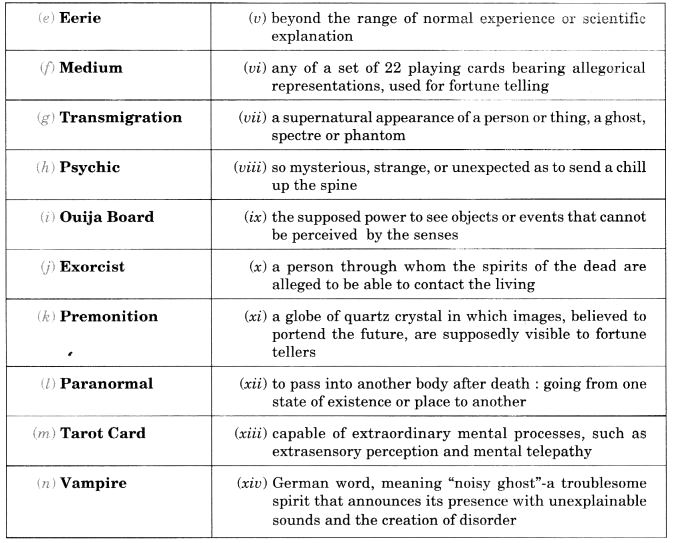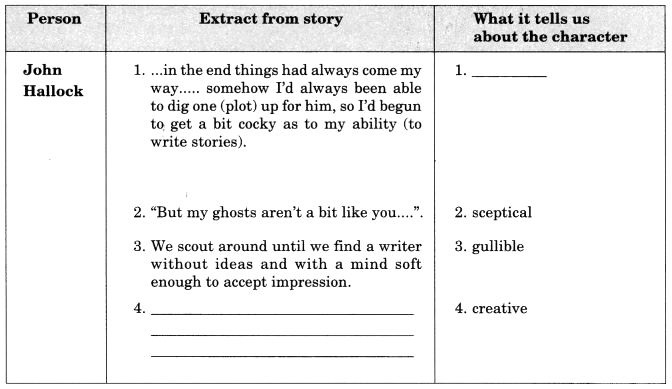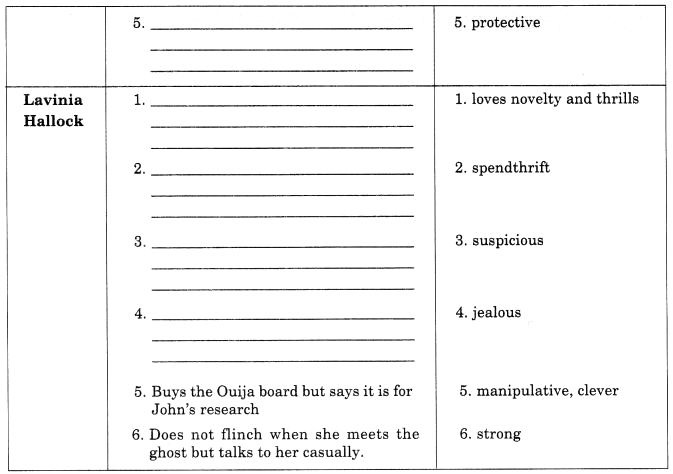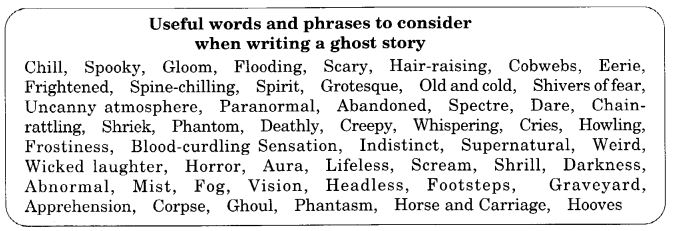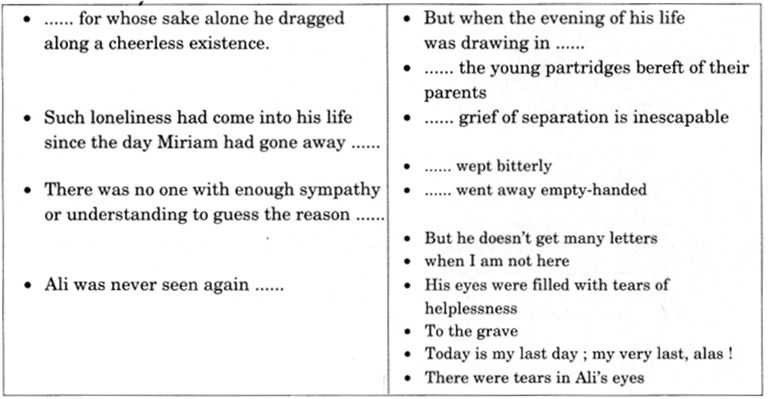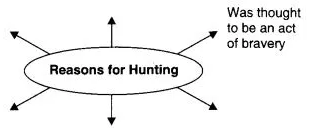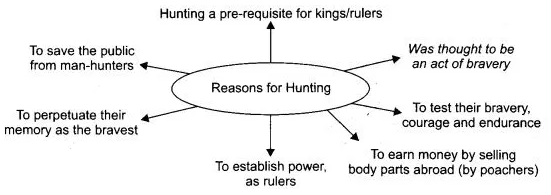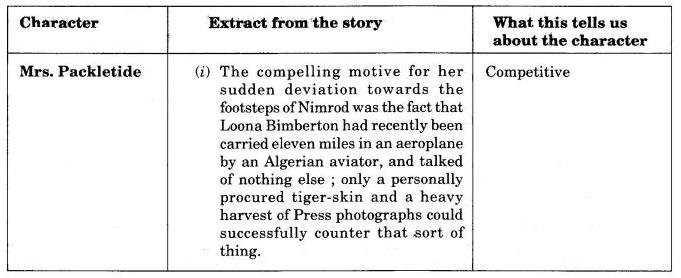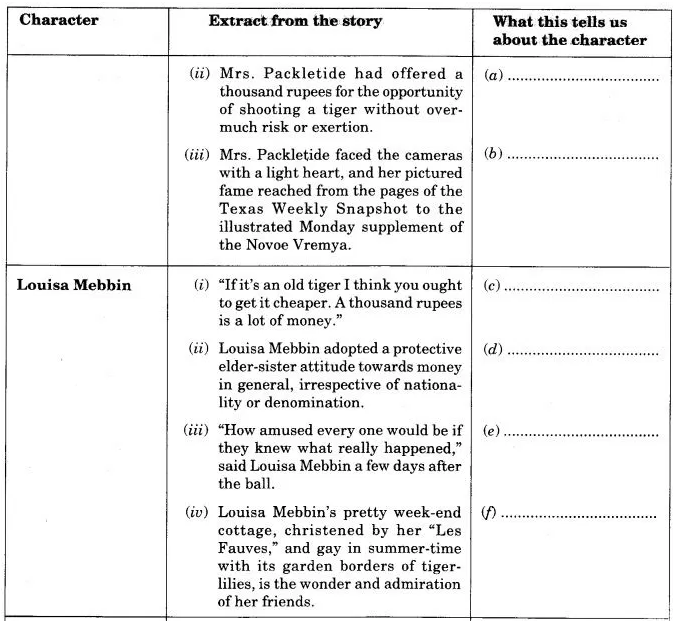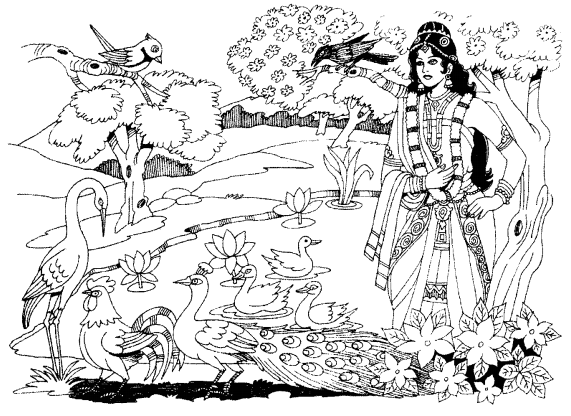NCERT Solutions for Class 10 English Literature Chapter 7 The Frog and the Nightingale are part of NCERT Solutions for Class 10 English. Here we have given NCERT Solutions for Class 10 English Literature Chapter 7 The Frog and the Nightingale.
All questions and answers from the NCERT Book of class 10 English Chapter 7 are provided here for you for free.
| Board | CBSE |
| Textbook | NCERT |
| Class | Class 10 |
| Subject | English Literature |
| Chapter | Chapter 7 |
| Chapter Name | The Frog and the Nightingale |
| Category | NCERT Solutions |
NCERT Solutions for Class 10 English Literature Chapter 7 The Frog and the Nightingale
TEXTUAL EXERCISES
(Pages 85 & 91)
Question 1.
Listed below are a few character traits of people. Some are positive qualities, while others are not. Tick mark the ones you feel are desirable qualities in a person.
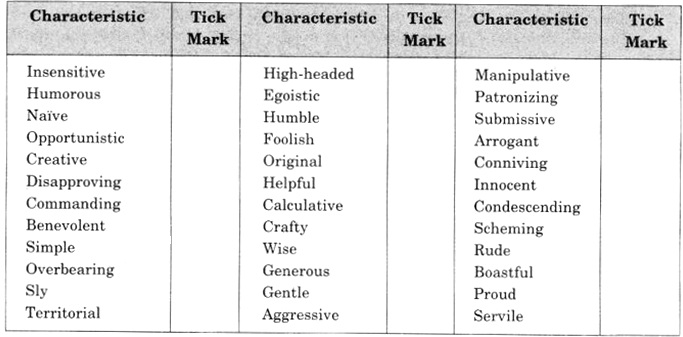
Answer:
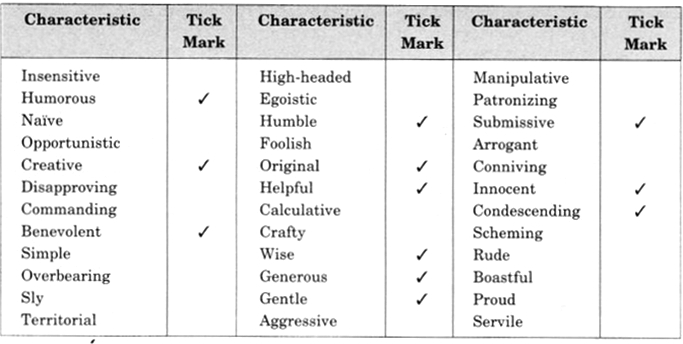
Question 2.
Have you come across people who are not what they seem to be-like someone who is extremely friendly and helpful yet you are not very comfortable with him/her as you feel it is a put-on ? Have a class discussion about such people and why you feel as you do.
Answer:
Meant for classroom activity. The following may help the students in their discussion.
Yes I have come across such persons. They, at first, are and can be successful in impressing others. But when the reality about them comes out they become the laughing stock. Also they lose something in their popularity and what they have shown earlier. We tend to develop distance between them as they stop being men of integrity.
A man with natural good human qualities and having integrity, honesty, large-heartedness, etc, is always respected in society. Such qualities defy time as they are basically human. Such persons always are the sources of inspiration for others.
Question 3.
Before you read the poem complete the word-web with the words that we associate with a Frog and a Nightingale.

Answer:

Question 4.
The following is a summary of the poem but it is jumbled up. Write out the events in their correct order to form a continuous paragraph.
(a) As a result, her voice lost its beauty, and the other creatures stopped coming to hear her sing.
(b) Soon the nightingale became famous, and creatures from miles around came to hear her sing.
(c) All the creatures in the bog cheered and clapped at her beautiful song.
(d) He offered to train the nightingale, so that she could sing even more beautifully.
(e) So the frog could sing unrivalled in the bog once more.
(f) The next night the frog introduced himself.
(g) The frog charged an admission fee, and earned a lot of money from these concerts.
(h) A frog croaked all night in a bog, in an unpleasant voice.
(i) But the frog made the nightingale rehearse continuously in the rain.
(j) One night a nightingale began to sing in a melodious voice.
(k) Finally, the nightingale burst a vein and died.
Answer:
The correct order is :
- (h)
- (j)
- (c)
- (f)
- (d)
- (b)
- (g)
- (i)
- (a)
- (k)
- (e)
Question 5.
Now that you have read the poem, add more personality traits to the word- web of the frog and the nightingale as depicted in the poem. Then complete the table given below. (Some of the words in the box below may help you. You may also use the words given in Q.1.)

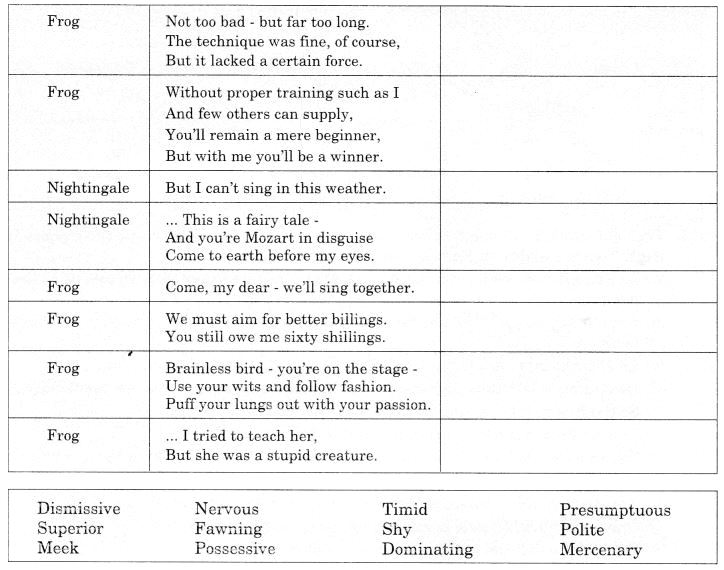
Answer:
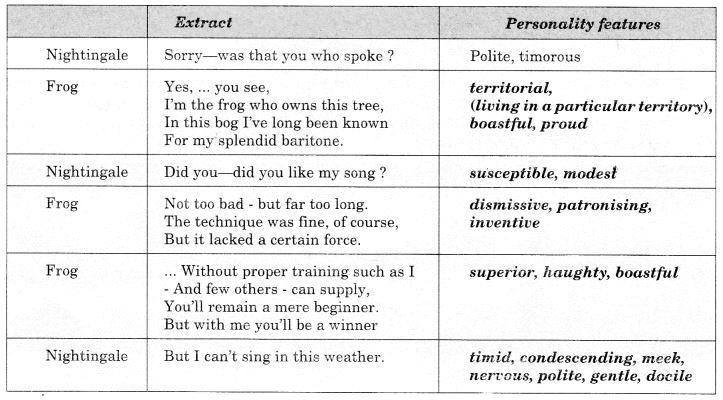
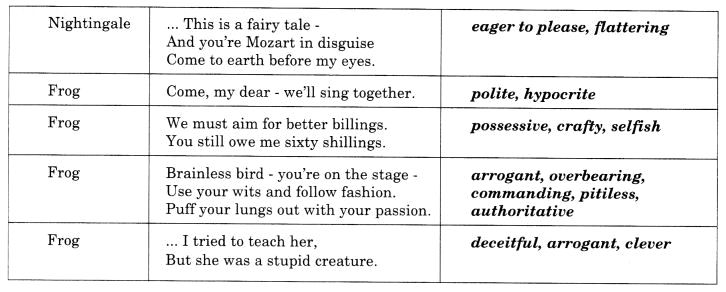
Question 6.
Divide yourselves into groups of four or five and brainstorm on any one of the given situations in order to create an imaginary dialogue or a comic strip. Keep in mind the characters and situations while doing so. Representatives from each group could then present the dialogues/read them to the class.

Answer:
Mainly for classroom activity. The following information for different situations shall help greatly in this sort of discussion :
The points to be discussed in group activity together with characters and situations in each case are :
(a) Other creatures hate the croaking of the frog. They throw stone at him, pray to him to stop croaking and use sticks. But the frog refuses to budge. They also insult him publicly, complain against him or throw stones at him. But everything is useless to silence him. He is such a shameless person that these do not have any effect on him. Students to focus on the efforts of the creatures to stop the croaking of the frog.
(b) When the nightingale sings for the first time, the frog gapes with amazement. Other creatures stare towards the sumac tree fully charmed by the melodious song of the nightingale. Ducks swim to her and herons wade to her to hear her sing. When she stops singing they clap in admiration. Toads, teals and tiddlers call it ‘Bravo !’
‘Too divine’, and demand her to sing more.
(c) The nightingale is awestruck when the frog introduces himself. It is because she had never anticipated such a diversionary view about her song. Strangely, the frog introduces himself in a detailed manner. In doing so he shows an authoritative attitude. Strangely, he does so in a gentle tone. He tells her that he edits the Bog Trumpet and writes songs for it also. Thus he poses to be an intellectual.
Shallow persons always succeed in showing off their hollowness through hyperbolic overtones. But the reality about them is soon out.
(d) The nightingale offers herself to be trained by this Mozart. It is the morning and it is raining. Her ‘training’ starts. But she says she can’t sing in such a weather. The frog offers to sing with her. His training lasts for six hours. He makes her sing from this tree to that tree physically exhausting her in the name of training. The nightingale shivers due to cold and her voice gets hoarse and quivering.
(e) The nightingale becomes a huge sensation. Creatures from far crowd the place to hear her sing. The frog charges admission fee and earns a huge money. A large number of titled gentry crowds the place. But such a thing doesn’t last long.
Soon the nightingale fails to earn money for the frog. He calls her to give the audience ‘something sharper, snappier’ and add some frills. But the nightingale can’t continue singing for long. Due to continuous singing and over-exertion she gets very weak and tired. Her voice zips and trills and the ticket office gross crashes.
The frog gets very angry and calls the nightingale ‘brainless’. He asks her to puff her lungs with passion. But he has drained her energies. Weeping and trembling she puffs up to sing but dies due to the bursting of her vein.
The reaction of the frog : He calls her stupid, too prone to influence. He leaves no alibi to be responsible for her death—a crafty and wicked being.
Question 7.
On the basis of your understanding of the poem, complete the sentences given below by choosing the appropriate option.
1. The frog’s aim was to
(a) make the nightingale a sensation
(b) make the nightingale as good a singer as him
(c) maintain his supremacy in the bog
(d) make a lot of money.
2. The animals reacted to the nightingale’s song with
(a) hatred
(b) admiration
(c) indifference
(d) suggestions for improvement
3. The nightingale accepted the frog’s tutelage as she
(a) was not confident of herself
(b) wanted to become as good a singer as the frog
(c) wanted to become a professional singer
(d) was not a resident of Bingle Bog
Answer:
- (c) maintain his supremacy in the bog
- (b) admiration
- (c) wanted to become a professional singer
Question 8.
Read the stanza given below and complete the sentences by choosing the appropriate option.
Day by day the nightingale
Grew more sorrowful and pale
Night on night her tired song
Zipped and trilled and bounced along,
Till the birds and beasts grew tired
At a voice so uninspired
And the ticket office gross
Crashed, and she grew more morose
For her ears were now addicted
To applause quite unrestricted,
And to sing into the night
All alone gave no delight.
(i) The nightingale was sorrowful and pale because
- she had been practicing in the rain
- she had been performing all night
- she was losing confidence in herself
- she was falling ill.
(ii) The audience was tired of her song because
- they had heard it many times
- it had become mechanical
- she looked tired
- she had added trill to her song.
(iii) She no longer enjoyed singing alone as
- she wanted to sing only for titled crowd
- she was now used to the appreciation she got
- the frog was no longer with her
- she had become proud of herself.
Answer:
(i) 2. she had been performing all night
(ii) 2. it had become mechanical
(iii) 2. she was now used to the appreciation she got.
Question 9.
Answer the following questions briefly.
(a) How did the creatures of Single bog react to the nightingale’s singing ? (V. Imp.) (CBSE 2014, 2015)
(b) Which are the different ways in which the frog asserts his importance ? (V. Imp.)
(c) Why is the frog’s joy both sweet and bitter ? (V. Imp.)
(d) Why was the frog angry ?
(e) How did the frog become the unrivalled king of the bog again ? (V. Imp.) (CBSE 2015)
Answer:
(a) The creatures of Bingle Bog reacted firstly to the nightingale’s singing very favourably. They, in fact, crowded the places where they could hear the nightingale sing so sweetly. Animals and birds came from long distances to hear her sweet and melodious song.
(b) The frog asserts his importance as a musician and an art critic. He also shows his importance that he owns the Bingle Bog and reigns supreme in it. He also tells her that if she gets training from him, she would scale new heights in singing.
(c) The frog’s joy is sweet because he is earning a lot of money from the nightingale’s singing. Secondly, he is getting success in tiring the nightingale out and killing her. His joy is bitter because the revenue is getting less and less. Obviously, the nightingale is not attracting a large crowd of animals and birds as expected by the frog.
(d) The frog was angry because the nightingale didn’t sing sweetly to enable him to earn more. Secondly, her voice was becoming ‘uninspired’. Her song now zipped, trilled and bounced along.
(e) The frog became the unrivalled king of the bog again after the death of the nightingale. Now no bird or animal could rival him in singing. Secondly, all of them over there were greatly scared of him.
Question 10.
Discuss the following questions and write the answers in your note-books.
(a) Bring out the irony in the frog’s statement—‘Your song must be your own’.
(b) Do you think the end is justified ? (V. Imp.)
(c) Do you think the nightingale is ‘brainless’ ? Give reasons for your answer. (V. Imp.) (CBSE 2014)
(d) In spite of having a melodious voice and being a crowd puller, the nightingale turns out to be a loser and dies. How far is she responsible for her own downfall ?
(e) Do you agree with the Frog’s inference of the Nightingale’s character ? Give reasons for your answer. (V. Imp.)
Answer:
Discussion at class level. The answers are given below :
(a) The irony here is that the frog means that the nightingale’s song is not hers but it has been stolen. Indirectly, he means to say that the nightingale steals others’ songs and that’s why her song is so melodious.
(b) The end seems to be appropriate as it justifies the truth that evil people at first have the upper hand over the innocent ones. Here the nightingale is alone ; so it is natural ‘innocence’ symbolised by her. This is crushed by the ‘cruel and crafty designs’ of evil frog.
(c) Yes, to a greater extent, the nightingale is ‘brainless’ because she doesn’t see into the things. She is innocent and credulous to the extent that whatever the frog says is accepted by her. She must have been worldly-wise, careful and alert. Also she should have seen beyond what the frog tells her. In a way she should not have followed what the frog told her to do.
(d) The nightingale herself is responsible for her own downfall as such men are bound to fail before the crafty and deceitful persons. She has no capacity to judge and evaluate the persons from their sweet tongues. That’s why, she is killed by the evil designs of the frog. He simply ploys her to her death.
(e) Yes, I agree with the Frog’s inference of the Nightingale’s character. She must have seen through the evil designs of the Frog and acted accordingly. But being innocent and simple-hearted, she didn’t evaluate the Frog’s tricks to liquidate her out of Bingle Bog. Being flattering and submissive she paid the price in her death.
Question 11.
The Frog and the nightingale’ is a spoof on the present society. Study the Mind Map given below. Divide yourselves into groups, select a box and discuss the statement given. Then present your views to the class
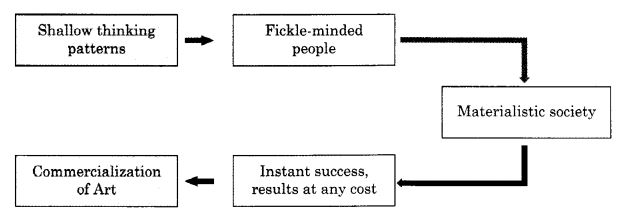
Answer:
Classroom activity. The following information shall help the students in their discussion :
1. Shallow thinking patterns are basically those patterns which dwell mainly on one’s selfishness and self-interests. These selfishness and self-interests are basically materialistic and harmful. Since these are born merely out of jealousy and ill-will, these produce fickle-mindedness in the people. Fickle-minded people have no backbone and can simply be harmful. They have no human virtues like fidelity, honesty and integrity.
2. Fickle-minded people have no locus standi of their own. They are simply those persons who pose to show that they are something. But in reality they are a group of brainless persons with a limited thinking. These persons are very dangerous as their sole aim is to cause damage to the progressive ones.
3. Materialistic society or materialism is the by-product of fickle-minded people and of those people who have a shallow thinking. People loving materialism are always showy and pompous. They have nothing to do with aesthetic or human virtues. They know only the mathematics of amassing materialistic things and looking at things in the name of buying and purchasing. The virtues that lie at the roots of a good person or a good thing are unknown to them.
4. Such materialistic persons have their eyes on successes by hook or by crook. They do succeed temporarily but in between face the music of their limited values. For instance, the frog aims to remove the nightingale and earn money. He earns money but for how long ? His clever plans succeed but partially. So materialistic persons succeed initially but not always.
5. If such persons are behind the art, art tends to be commercialized. The frog commercializes the art of singing of the nightingale. He treats the nightingale as a hen that lays golden eggs. But for how long ? So if art is in the hands of the people like the sly and wicked frog, God save us ! True art lies not in material terms but it is deeply connected with the aesthetic qualities of men. If it is balanced with materialism it ceases to be true Art.
CLASS DISCUSSION
How a person tries to put down another when that person is succeeding in his or her life.
Our self-image is often based on what others make us believe we are. A poor self-image can do irreparable damage to us. Do you agree with this statement ? Elaborate with suitable reasons and examples.
Answer:
Mainly for discussion at class level. The following shall help the students in their discussion :
Yes, I agree with this that our poor self-image can do irreparable damage to us. A poor self-image means loss of self-confidence or low self-confidence. This, too, is very bad as it never lets a person face the harsh and bitter realities of life. Low self-confidence or over self-confidence are both bad. There are many persons around us who may not digest our progress. So they may try to derail us by sweet talks. But their sole aim is to show that they are our well-wishers. But in reality their jealousy and ill-will damage us in one way or the other. Obviously, we should not take them on their face value or by their sly and clever talks. In fact, we should judge or evaluate their hypocritical advice or interpretation objectively. Flattery is another tool to damage us. In fact, we should always keep in mind that all that glitters can never be gold. If the nightingale had understood and evaluated the frog’s ‘sweet’ talks, she shouldn’t have died.
WRITING TASK
Question 12.
The nightingale has scaled the heights of success. But now the audience is dwindling, the frog is unhappy and reprimands her all the time. She is mentally and physically exhausted and fears failure. As the nightingale, write a diary entry highlighting her fears and analyzing the reasons for her failure.
Answer:
Sunday, 17th September, 20 – 9 pm
I can’t forget when the frog came to me for the first time and spoke sweet words. Those words were never sweet. But my foolishness and too much submissive nature made me feel so. Now I clearly visualize the crafty nature of the frog. He has really duped me and I, being foolish, believed in him !
I see now that I can’t sing melodiously as I did earlier. When I sang with my own choice and will, I sang melodiously. The sly frog charged fees and earned a lot. He compelled me to sing with trills and frills and change the style. He said that it was all in the name of training. But now I realize it was not training but killing me slowly due to overwork and exertion.
At this point of my life I see myself defeated at the hands of this sly frog. I feel physically exhausted. I can’t sing non-stop. I find myself physically exhausted. Truly he took full advantage of my innocence and simple-heartedness. Very cleverly he led me to my own death without any alibi. I want to leave a message that we must not believe in what others say about ourselves.
Nightingale
Question 13.
Write an obituary for the nightingale. You may begin like this : May the kind soul (or you may make use of your own beginning).
Answer:
An Obituary for the Nightingale
May the kind and innocent soul of the Nightingale rest in peace ! The Nightingale was really innocent, simple-hearted, cooperative and compassionate. In her death she has left a vacuum which is difficult to fill up. She had malice towards none but had to pay the price of being innocent, submissive, simple-hearted and credulous. But strangely she herself became a victim of the modern evils like craftiness, selfishness, and the power of place. One must be vigilant, alert and suspicious of others, especially of the sweet-tongued. One must be conscious that all that glitters is not gold. We must shun the people having the qualities of the frog. Being credulous is always harmful.
LISTENING TASK
Question 14.
Listen to a poem on a similar theme by Mary Howitt and compare the Fly to Vikram Seth’s Nightingale.
Answer:
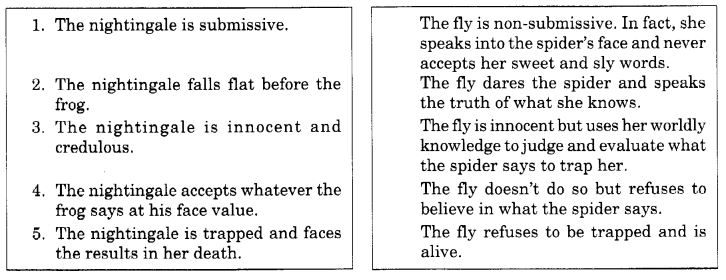
We hope the NCERT Solutions for Class 10 English Literature Chapter 7 The Frog and the Nightingale help you. If you have any query regarding NCERT Solutions for Class 10 English Literature Chapter 7 The Frog and the Nightingale, drop a comment below and we will get back to you at the earliest.

